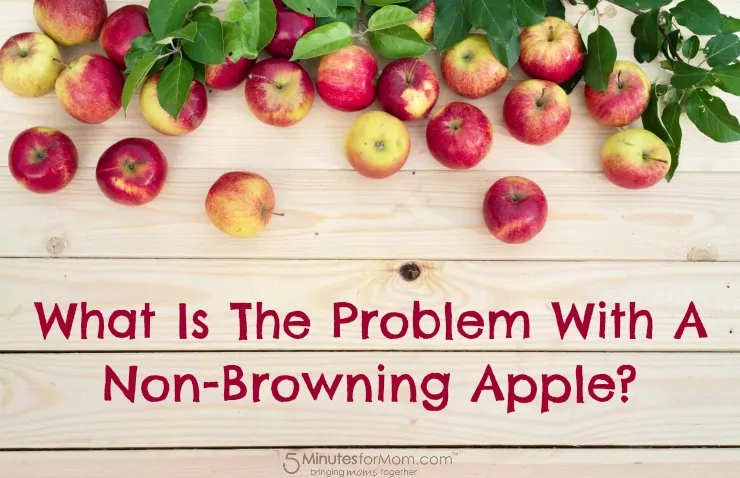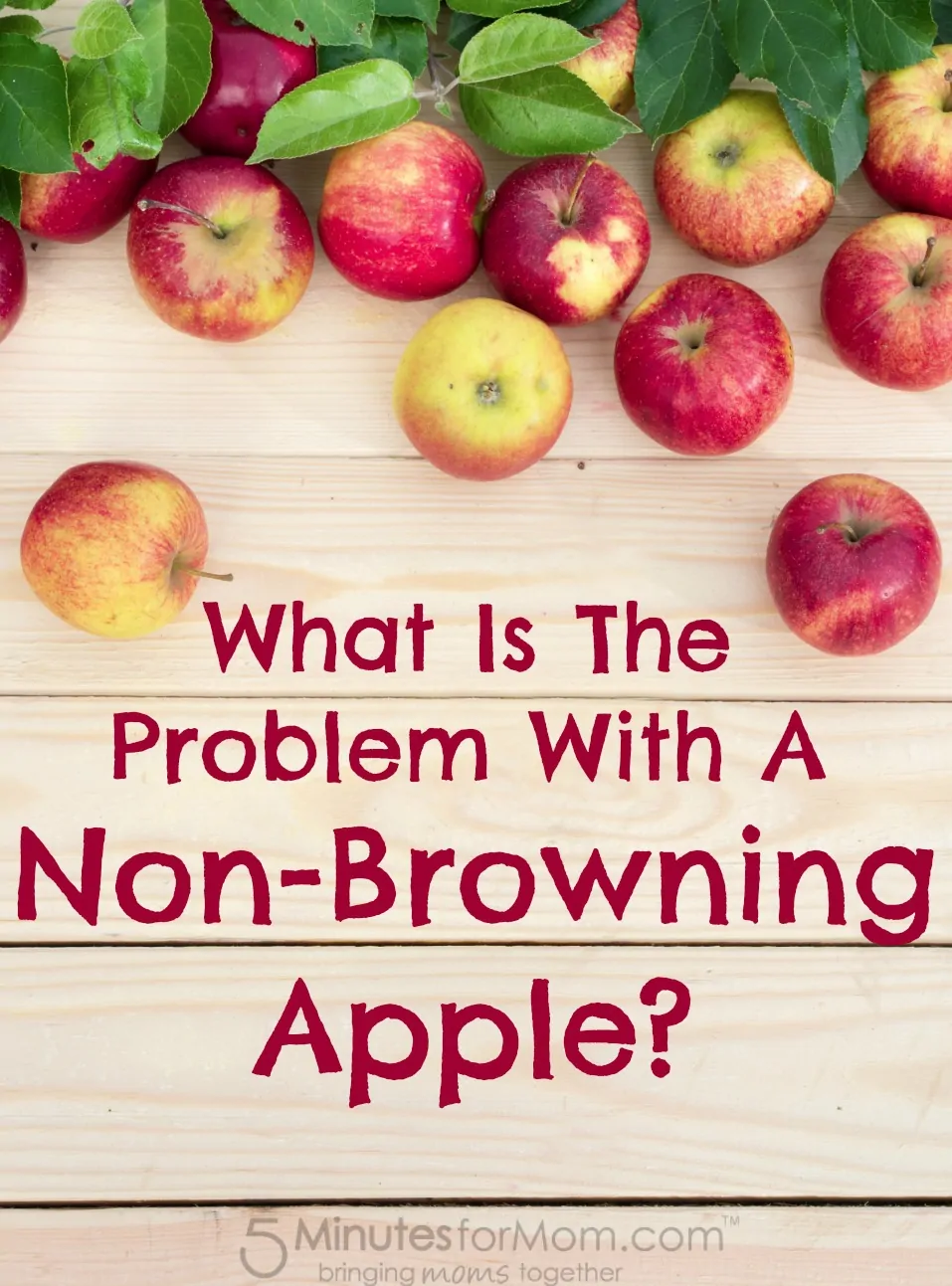This post may contain affiliate links. Read my disclosure policy here.
It’s been two weeks since the USDA approved the non-browning apple. This is a genetically modified apple that doesn’t start browning until 12-15 days after it’s first been cut. Is this technology a big deal? Should parents be concerned?

We asked Suzanne Bertani from Mommy Footprint to answer a few questions. She is part of a group called GE Free BC that has been working to educate Canadians on GMOs. The GE (non-browning) apple is an issue in Canada since the non-browning apple technology is currently in front of the Canadian Government.
What Is A Non-Browning Apple?
These apples have been produced by science not nature. To silence the browning gene within the apple, the company inserts modified apple DNA from at least three different species; a virus and two bacteria. The result is the browning gene is silenced so they will not turn brown even if they are rotten or have been cut. These apples will not be labeled because North America doesn’t label for GMOs, so you might not realize you are purchasing them if they make it to the grocery stores.
Why Should We Be Concerned?
We compare releasing GMO technology that is untested on animals into the environment like a Pandora’s box. What are the implications? We fear we don’t know all the harm yet. Selling untested science before animal studies are done is not responsible. The greatest fear is contamination since bees pollinate fruit trees. Organic and conventional apple growers are against GMO apples because of contamination concerns. Our Province of BC and many US States have an apple export industry that has been respected worldwide. Has the US just lost their apple exports with the approval of the GM apple as many countries worldwide have banned GMOs?
What Can We Do?
The Canadian Government is currently reviewing the safety of the non-browning apple in secret. We have no way of knowing what they will decide. The most effective way to voice our disproval of the GM apple is talk to or email our grocery store owners and Managers. Next time you are at a store, ask the store Manager or Produce Manager if they’ve heard of the non-browning apple. Let them know you don’t want the store to carry this apple if our Government approves the technology. As a consumer, you are concerned about this untested science making an entrance into our grocery stores. If the apple is approved in Canada, we want our consumer voices to be heard collectively that this isn’t the legacy we want to be known for in BC; being the Province that created the 2nd genetically modified fruit in the world.
The company that purchased the technology for the GE apple has pears, peaches, and cherries lined up next with the technology ready to go. Now is the time to protect something so basic, so important to our families…food! Keeping our food system clean for our children to inherit might seen like a basic right, but it’s becoming more important to educate ourselves and make our voices heard with how we spend our consumer dollars. Currently the only way to avoid eating GMOs is to buy organic, GMO free verified food. Limit processed food and become engaged with your food. Grow it, learn about it, cook it from scratch.
For more information on the GE apple, follow GE Free BC on Facebook.
Pin It For Later
Help spread the word, pin this image…












Teresa Lynne says
Thank you, Mommy Footprint, for bringing this issue to the public. The small company in the Okanagan, Okanagan Specialty Fruits, has now sold to a huge American corporation, Intrexon. This company also owns the patent for the genetically engineered salmon. It is imperative to make sure we, as consumers, stop the apple from being approved in Canada. Our resistance will affect the sales in the US. Send emails to grocery store chains, talk to your grocery store managers. Let them know we don’t want the GM apple!
B Edge says
Lots of misinformation here. The non-browning apple has no effect on rot, which will still turn brown. If anything, the non-browning characteristic will make it easier to determine if an apple is rotten, instead of just brown from exposure to air.
There is no real problem with pollen from non-browning apple trees “contaminating” organic or conventional apples, because an apple fruit tissue originates only from the tree on which it is produced. Only the seeds would have any trace of GM DNA even if cross-pollination occurs.
Fruit trees like apples are not grown directly from seeds in practice. Seedlings are grown from cuttings from a tree of the specific variety, and are then grafted onto rootstock with specific characteristics like disease and insect resistance or dwarfing characteristics.
If you have additional questions or concerns, you should ask the folks at http://www.arcticapples.com/. They are more than happy to answer questions and their site has lots of good information about these apples, unlike a lot of the scare sites you find around the internet. And no, I do not work for Arctic Apples (but I would have no concerns against working for them). I am just a plant breeder/scientist who wants the true story to be heard.
Teresa Lynne says
The real concern is that apples are open pollinated and as such all apple seeds (embryos) gain half their genome from the mother plant and half from the pollen parent. If the pollen parent is GM Apple (and I have no idea how OSF thinks this will not happen) then all resultant seedling trees will be potentially contaminated. We get new and improved apple cultivars from chance seedlings (Ambrosia, Granny Smith, Red delicious, Golden delicious for example), that is trees that come from open pollinated seedlings that are then asexually propagated via budding and grafting (their genomes faithfully replicated in each tree).
So it is correct that the GM non-browning gene will not be in the apple (mother plant tissue) but that is not the point. Rather, the gene will be in all 10 embryos (one in each of the 10 seeds) in that apple – and all will be waiting for the chance to germinate and spread their genes, in this case the GM apple genes.
This is the issue – from a genetic contamination point and the future of apple production. OSF needs to stop deceiving people that the apple will not contain GM Apple genes. The GM apple won’t but all the seeds can. And if you figure that an apple tree might produce 2000 (or more) apples X 10 seeds per apple, that’s 20,000 chances per tree pollinated by genetically engineered apples for the gene to escape into the wild.